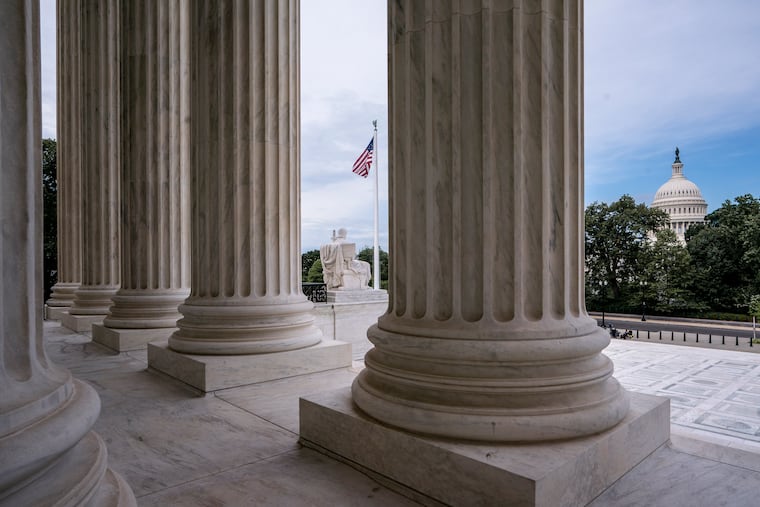Trump’s ban on transgender troops hurt the military, former service surgeons general say
Trump and military officials argued that barring transgender people from serving would improve readiness and strengthen unit cohesion. Former top military physicians said the opposite has occurred.

President Donald Trump’s order banning many transgender people from serving has eroded the military’s ability to fight and win wars by narrowing its recruiting pool and lowering morale among transgender troops exempt from the policy, former top military physicians said in a new study.
Defense Department regulations implemented April 12, 2019, prohibit anyone with gender dysphoria from enlisting but allow transgender service members who were serving before then to remain in uniform.
Trump and military officials have argued that barring transgender people from serving would improve readiness and strengthen unit cohesion. But a study published by the Palm Center, a research institute that studies LGBTQ personnel issues in the military, said the opposite has occurred.
"The transgender ban has harmed military readiness across the board. That's what happens when the military needlessly discriminates against people who are qualified to serve," said Alan Steinman, a former U.S. Coast Guard director of heath and safety and retired rear admiral.
Steinman was one of the study's six co-authors, who also include a former Army and Navy surgeon general. Their conclusions are based on public statements from senior officials, interviews with transgender troops, survey data and conversations with faculty members at service academies.
Nearly 15,000 transgender troops serve in the military, according to estimates of Pentagon figures by the Palm Center, some of whom joined after President Barack Obama allowed transgender people to openly serve in 2016.
Pentagon officials did not provide a comment on Friday after receiving a copy of the study, which was obtained by The Washington Post ahead of its release this week.
The researchers found that the Trump administration ban bruised morale among transgender service members who in interviews said they have been "targeted for unfair treatment, stigmatized and devalued."
"Before the ban, the Navy's stance was that transgender people are real people and they have a status and we're going to help them transition to what they need to be so they can continue to serve," an unnamed Navy aviation electronics technician who flew in combat told the authors. "But now that the ban has been reinstated, there's no longer anyone trying to accept us anymore."
The study found that Trump's policy blunts recruitment efforts by eliminating consideration of many transgender people of prime recruiting age.
Potential recruits can enlist or commission only if they conform to their biological gender and don't have a history of gender dysphoria, according to Pentagon regulations. That is a change from the Obama policy, which allowed enlistment under preferred or biological sex if recruits are "stable" in either one after 18 months.
The ban may also turn away prospective recruits who are not transgender by creating the impression that the military is a breeding ground for intolerance and hostility to certain people, the study found, after reviewing polls that concluded most Americans support transgender people in uniform. The military already faces recruiting challenges as a range of issues, such as obesity, disqualify many young Americans.
Capt. Alivia Stehlik, an Army officer at Fort Carson in Colorado who transitioned to a woman after the Obama policy was implemented, echoed the frustrations of transgender troops interviewed for the study.
Stehlik commissioned as an Army infantry officer and later became a physical therapist. After a colleague could not make a deployment to Afghanistan in 2018, Stehlik said she volunteered to go and helped soldiers recuperate from injuries there.
Her time in a ground combat unit, and the tab on her uniform denoting that she graduated from Ranger School, wins credibility from grunts and commanders alike, she said.
But the ban also produces different requirements for transgender troops, she said, like needing higher-level approval for gender-related medical care compared with other issues, such as treatment for injured knees or backs.
"It's telling the world you don't care about soldiers," Stehlik said of the policy. "Let us do our jobs, and if we can't meet the standards, then we need to leave. But the standards shouldn't be different for us."
Stehlik is among an estimated 1,600 transgender troops exempt from the 2019 policy, which allows them to continue with related medical care and serve in their preferred gender, but the study found accessing that care is often challenging and stigmatizing.
Trump and other officials, including former defense secretary Jim Mattis, warned that transgender inclusion could erode unit cohesion. But In 2018, as the ban was litigated in court, senior officials in the Army, the Air Force, the Navy and the Marine Corps said they were unaware of problems created by transgender troops and did not have reports of unhappiness about the policy within the ranks.
Trump has also said that medical costs for transgender troops are "very high," but a Pentagon-commissioned study by the Rand Corp. in 2016 concluded that the costs would be small and noted that not all transgender people want or need medication or care.
President-elect Joe Biden said in February that he would roll back the ban on his first day in office. He signaled that commitment with the selection of Shawn Skelly, a former Navy officer and transgender advocate, to his Pentagon transition team this month.